Egypt Warns Iran Against Targeting Israelis On Its Soil – Report
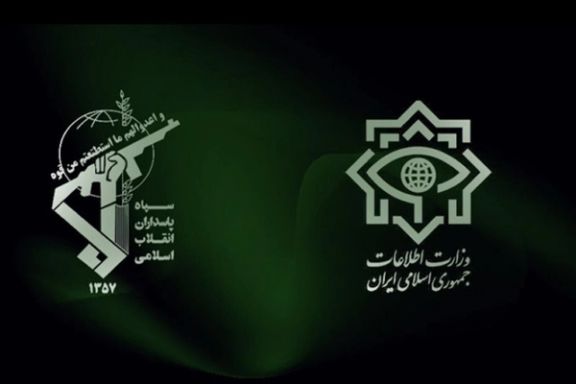
Egypt has reportedly warned Iran not to target Israelis on its territory, demanding to be kept out of the Islamic Republic’s shadow war with Israel.

Egypt has reportedly warned Iran not to target Israelis on its territory, demanding to be kept out of the Islamic Republic’s shadow war with Israel.
Citing unnamed sources, London-based pan-Arab daily Al-Arabi Al-Jadeed said on Wednesday that Egyptian security officials warned Iran not to operate on Egyptian soil during recent meetings among intelligence officials.
According to the Qatar-backed media outlet, Egyptian officials warned Iranian counterparts that any attempt to carry out attacks against Israelis in the country would harm ties between Cairo and Tehran.
“Egyptian officials informed their Iranian counterparts that Egypt will not accept the its security reputation to be tied to the ongoing conflict between Tel Aviv and Tehran,” which has flared up following a series of killings of scientists and elements of the Revolutionary Guards as well as several cyberattacks by both sides.
The sources said that “the Iranian side assured Egyptian officials that Iran is keen not to harm the state of peace with Egypt” and that “Israeli allegations about attempts to target Israeli tourists in third countries is a lie,” despite reports that Turkey and Israel recently thwarted attempts to target Israeli civilians in Turkish territory.
“The Egyptian warning to Tehran came after leaks obtained by Cairo from the Israeli side, claiming that Egypt and the UAE are the new likely countries where Iran seeks to target Israelis,” following the failure in Turkey, “which prompted the Iranians to think of alternatives to restore their credibility," Al-Arabi Al-Jadeed reported.
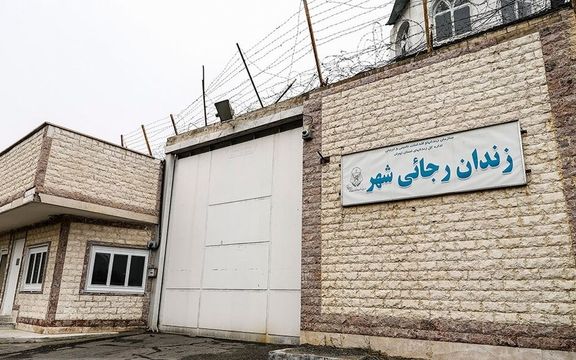
About a week after the execution of eight people in Rajai-Shahr Prison in Karaj, aka Gohardasht Prison, 10 other prisoners were executed in the same jail on June 29.
According to human rights groups, at least 97 prisoners have been hanged in Iranian prisons during the past 40 days.
Earlier in the month, human rights groups said the Islamic Republic hanged 12 Baluchis, including one woman, in Zahedan prison in the southeastern province of Sistan-Baluchestan.
In a communiqué released on Tuesday, the leaders of the Group of Seven (G7) reiterated their shared profound concern over “the continued human rights violations and abuses in Iran,” including arbitrary arrest and detention, as well as Iran’s increased use of capital punishment.
A few days earlier, UN Secretary General António Guterres released a report on the situation of human rights in Iran, decrying “the high number of death penalty sentences and executions” and “reports of death in prison due to denial of adequate and timely medical care.” The UN chief said that the number of executions in Iran increased from at least 260 cases in 2020 to 310 individuals in 2021, and the number continued to rise into 2022.
Earlier in the month, Amnesty International’s annual report on worldwide use of the death penalty showed Iran as a country with a “disturbing spike” in executions.
The 66-page report found Iran executed at least 314 people in 2021, a 28 percent jump from at least 246 in 2020 and the highest figure since 2017. Amnesty said that in Iran “death sentences were disproportionately used against members of ethnic minorities.”
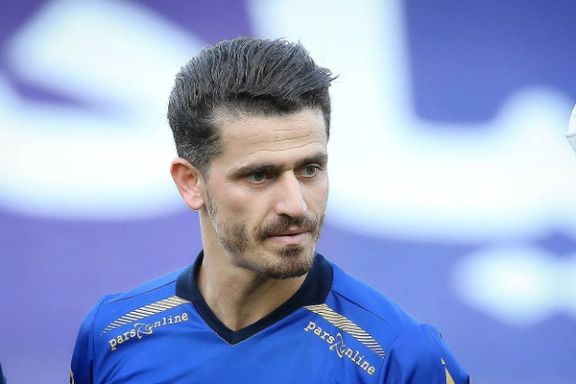
Many Iranians are praising a football star who was fired from his team for criticizing the government, and they condemn the authorities for pressuring athletes.
Fans took to social media when it became clear on Tuesday that the Persian Gulf Pro League Esteghlal FC had no intention of renewing the contract of its captain, Voria Ghafouri and pushed the hashtag “Voria is not alone” to the top of Persian Twitter. A group of Esteghlal fans also held a protest rally outside the club’s headquarters after the announcement was made on Wednesday.
Ghafouri’s future with his club and the national team became highly doubtful in May when he rebuked the government for its handling of protests sparked by a sudden rise in prices and many feared that the authorities would push for his exclusion from his team as punishment.
“Voria Ghafouri was excluded because he did not consent to side with the government against the Iranian people,” dissident blogger Hossein Ronaghi tweeted. “In the Islamic Republic sports is totally political ... Elimination of popular athletes [who speak up] is meant to cover up the crimes of the government,” he wrote.
Hardliners deny any connection between the footballer’s political views and his exclusion from his team due to alleged interference of state authorities.
In a tweet Wednesday, Abdolreza Davari, one of former President Mahmoud Ahmadinejad's advisors and confidants who later turned against him, accused the former captain of Esteghlal FC of making controversial statements “to play victim” because he knows but at the age of 35 he is no longer physically fit to play and that the renewal of his contract is not likely.
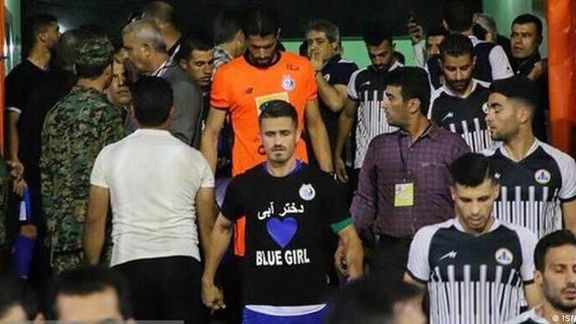
“It is the right of the Iranian people to live a happy life,” the national team star said in a post-match interview in May in reference to the economic and social pressures Iranian people have been enduring and said authorities responsible for it must feel shame.
The outspoken footballer has been in trouble with the authorities for quite some time. In 2019 he was summoned for explanations after he criticized Foreign Minister Mohammad-Javad Zarif in an Instagram post for saying Iranians were “proud of being under pressure defending the people of Palestine, Lebanon, Yemen and Syria.”
"You are not under pressure … It is the ordinary people who are under pressure," Ghafouri retorted to Zarif.
Ghafouri’s criticism of Iran’s regional policies and the authorities for downplaying the impact of US sanctions on ordinary Iranians also drew an angry response from Supreme Leader Ali Khamenei.
"Some people, who benefit from the country's peace and security enjoying their jobs and their favorite sports, bite the hand that feeds them,” Khamenei said in a clear reference to Ghafouri in a public speech on February 18, 2019.
Ghafouri was summoned by the Ministry of Sport for an explanation for his comments within a few hours of Khamenei's speech.
The footballer is also known for supporting women's right to watch football in stadiums from which they have been banned for over four decades.
In 2019, a young girl, Sahar Khodayari, died in hospital after setting herself on fire outside a court in Tehran where she was to go on trial for attempting to enter a stadium disguised as a man to watch her favorite team. She became known as ‘The Blue Girl’ for the color of her club. Ghafouri wore a jersey with Blue Girl written on his chest to honor herbefore a match.
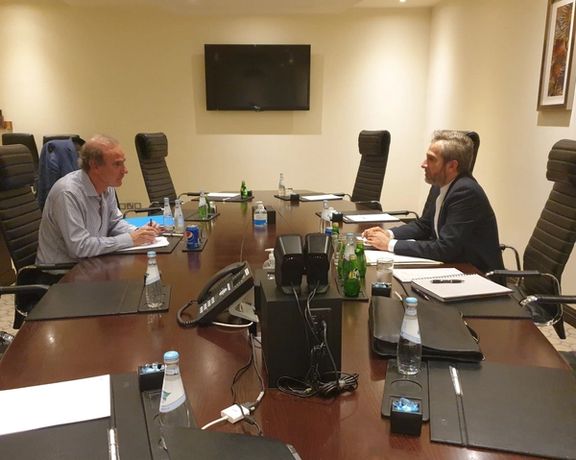
Indirect talks between Tehran and Washington in Qatar to resolve remaining issues in negotiations to restore the landmark 2015 nuclear pact ended without progress.
Calling the proximity talks “two intense days” of negotiations, EU's envoy Enrique Mora tweeted Wednesday evening that “Unfortunately, not yet the progress the EU team as coordinator had hoped-for. We will keep working with even greater urgency to bring back on track a key deal for non-proliferation and regional stability.”
It is not clear whether there might be a further round, while Tehran and Washington have yet to comment on how the talks have progressed, or what they expect next.
Moreover, Axios quoted an unnamed US official as saying that "The Iranians have not demonstrated any sense of urgency, raised old issues that have been settled for months, and even raised new issues that are unrelated to the 2015 nuclear agreement.”
According to the source, “A deal has been available for some time. If there is a side that needs to take a decision, it’s them — and it’s been them for months."
Earlier in the day, Tasnim news agency, with links to the Revolutionary Guards, reported that the Tehran-Washington nuclear talks in Qatar had ended without agreement, a claim quickly rebutted by the foreign ministry.
Tasnim said the American side refused to give "guarantees for Iran's economic benefits” from the deal.
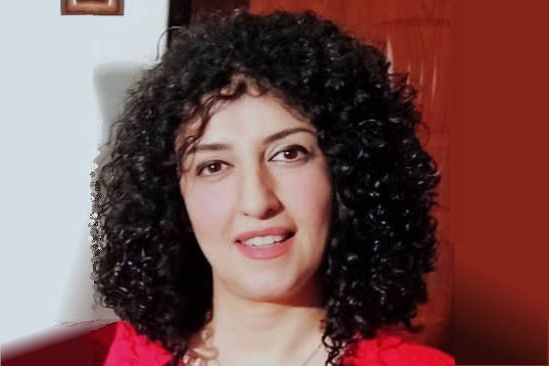
Amnesty International says Iran is torturing prize-winning rights activist Narges Mohammadi by denying her proper healthcare in reprisal for her campaigning.
The rights group said Tuesday that Mohammadi, who suffers from lung and heart conditions, was taken to the infirmary of the notorious Qarchak women's prison on June 23 after experiencing shortness of breath and an irregular heartbeat. (https://www.amnesty.org/en/documents/mde13/5775/2022/en/)
Health and sanitary conditions at Qarchak, located forty kilometers to the south of the capital Tehran, are very poor in comparison with prisons such as Evin where most political prisoners and prisoners of conscience are usually held.
Since her return to prison from hospital, prison authorities "have been denying Mohammadi some of her required medication,” Amnesty added.
Her husband Taghi Rahmani, who is based in Paris, accused the prison authorities earlier this week of deliberately withholding medication sent by her family to treat a lung condition.
In a five-minute trial in late January, she was sentenced to eight years in jail and 70 lashes by Branch 26 of the Revolutionary Court, on trumped-up political charges.
Mohammadi, who was arrested in November last year, has been to jail several times over the past two decades. She was freed from Evin Prison in September 2020 after serving more than five years when she had no contact with her husband and children for long periods of time.
Persecution of human rights and political activists and executions have increased since hardliner president Ebrahim Raisi took office last August.
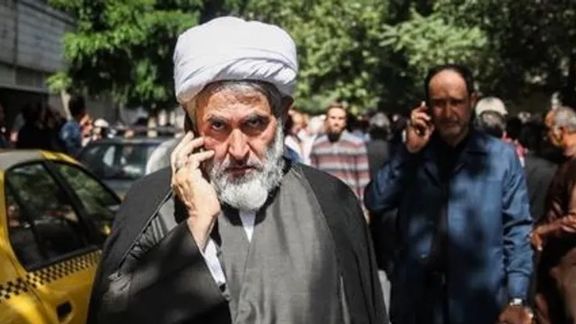
In another apparent twist at the top of Iran’s Revolutionary Guards, the New York Times claimed Wednesday that Brigadier-General Ali Naseri was arrested a month ago.
The Times was vague on Naseri’s position in the Guards (IRGC) and how it related to the removal last week of Hossein Ta’eb, the Guards (IRGC) intelligence chief, in the face of disquiet in senior circles over Iran’s response to a covert Israeli campaign.
Iran International has reported disquiet among top ranks over intelligence failures demonstrated by the May 22 assassination of IRGC Quds (Qods) Force colonel Hassan Sayyad in Tehran, while state media has also implied that the deaths of two aeronautical staff in late May and early June were suspicious.
The New York Times quoted Keren Hajioff, senior advisor to Israeli prime minister Naftali Bennett, that Israel was following a “new tactic” based on Bennett’s ‘Octopus Doctrine.’ The advisor said: “Now we go straight for the head,” instead of IRGC’s proxies in the region such as the Lebanese Hezbollah.
The paper cited an unnamed Israeli official that “part of the strategy entailed exposing failures by the Revolutionary Guards in their covert war with Israel in the hope that it would create conflict between political leaders and the defense and intelligence establishment.” Rivalries within the IRGC – with Esmail Ghaani (Qaani), head of the IRGC extraterritorial Qods Force, and Esmail Khatib, intelligence minister, critical of Ta’eb – would suit the Israelis’ approach.
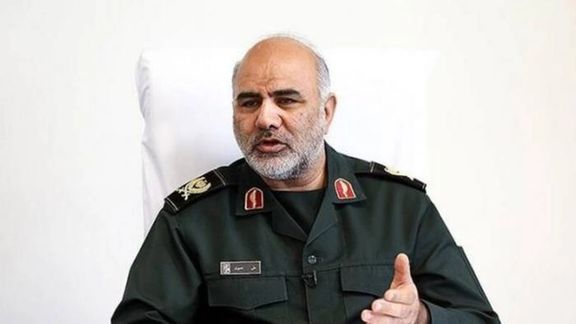
The Times described Naseri as “a senior commander in the Revolutionary Guards’ Protection of Information Unit, tasked with oversight and supervision of the organization’s work,” although the paper sourced this to an April 21 2019 story from Radio Farda that Naseri had been replaced in that position. The Iranian Students News Agency also reported at the time that Naseri had been removed.
‘Criminal media networks’
Two months later, on June 11, 2019, IRGC spokesman Ramezan Sharif addressed what he called rumors of the arrests or fleeing of commanders. These were efforts by Iran’s enemies to cause disruption through “criminal social media networks and media.”
Sharif insisted that three individuals named in various websites – taken to mean Naseri, Mohammad Tavalaee, and Mostafa Rabiee – were “active in new positions” and were “seriously performing in their missions and carrying out their duties,” with some of their public appearances reported in Iranian media.
There had been suggestions at the time that Naseri had fled the country, with the Washington Free Beacon claiming he had defected to an Arab state in the Persian Gulf taking with him secret documents.
The 2019 reports of Naseri’s dismissal came the day before Supreme Leader Ali Khamenei appointed General Hossein Salami as overall commander of the IRGC and two weeks after then US president Donald Trump added the IRGC to the US list of ‘foreign terrorist organizations.’
It remains unclear what position Naseri occupied prior to his recent alleged report. If he had been replaced in 2019, how he could have been trusted with another sensitive post?
So far, three key IRGC intelligence and security figures have been replaced and Ta’eb’s ally, parliament speaker Mohammad Bagher Ghalibaf is being attacked by some hardliners for corruption, an allegation widely believed to be true among Iranian observers who have followed him through his military and political career.